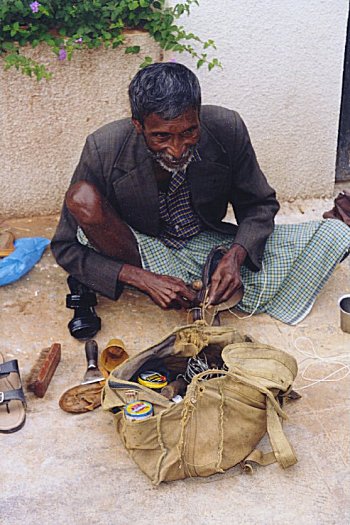The Dalits
by Vikas Kamat
First Online: December 01, 2006
Page Last Updated: December 07, 2024
The Dalits are the collection of all the communities of India who were denied a status in the traditional Caste System of India. They were considered even lower that the lowest caste, namely the Shudras. Gandhi coined the word "Harijan" or "Children of God" to collectively address this community, but over a period of time, even the word Harijan has been considered derogatory. The politically correct term to use is "Scheduled Castes" or "Dalits". Literally, a Dalit means an exploited person.
Untouchability and Exploitation
Although Hindu scholars dispute the relationship of untouchability to Hindu codes, the rigid caste system prevalent in India denied social status and civil amenities to a class who were poor and took up menial professions such as cleaning, and washing.
In various parts of India, it was considered unholy to even touch the Dalits (hence the name asprushya or untouchable), and the Dalits could not use the same public facilities (such as well, or a restaurant) frequented by the upper-castes.
Mahatma Gandhi, during his leadership of India during the 20th century, made fight against untouchability as one of the top priorities of India and implemented many programs. Entry into temples, sharing meals with the Dalits, and voluntarily performing jobs (such as cleaning toilets) meant for the Dalits were some of these activities.
© K. L. Kamat

Picture of a Dalit Cobbler (Chamar)
The Ugly Turn of Reservations
After India became independent (in 1947), the successive Governments implemented many plans to better the conditions of the Dalits. The most important of them are the "Reservations" or the "Quota System" (also called "Roaster System"), where many privileges of the Government were to be provided only for Dalits; privileges such as job quotas, admissions to universities, political appointments, political representation, and even promotions within the Government.
This affirmative-action type of policy has led to a lot of controversy and social turmoil in India due to the following reasons.
-
Abuse of the system -- The rampantly corrupt system of India has been used by non-Dalits to enjoy the benefits meant for Dalits.
-
Repeat Beneficiaries -- The few Dalits who benefited from the reservations, keep reaping the benefits again and again, thus denying the opportunity to first time beneficiaries.
-
Reverse Discrimination -- Selecting candidates based on caste, rather than their merit or qualifications has caused a lot of anger and resentment.
-
Conflict with Scheduled Tribes -- The reservations for Dalits are often combined with reservations meant for aboriginals and other backward classes of India.
Religious Conversions and Conflict
Many Dalits who came in contact with Christian missionaries chose to abandon their Hindu roots and adopted the Christian faith. This religious conversion has given rise to two folded turmoil in India. First, due to conversion, the Dalits lost the privileges meant for Scheduled Castes -- Christianity is believed to be void of the caste discrimination, and the quotas were meant for people who otherwise were socially backward. Many laws were passed so that people thus converted could continue to enjoy the special quotas, after agitations and counter-agitations. Secondly, the Dalits are torn between retaining their cultural identity and adopting a new one.
Many Dalits are also converting to Buddhism, following the footsteps of Bhimrao Ramji Ambedkar, a great Dalit leader.
Some Important Dalit Leaders
- Guru Ghasidas -- 19th century Dalit Saint
- Peddanna -- A Virashaiva Saint who was born as an untouchable.
- B.R. Ambedkar -- A very important leader who gave expression to the Dalit movement. Also an architect of India's constitution, and later converted to Buddhism.
- K.R. Narayan , who went on to serve as the President of India.
- Mayawati -- A Dalit woman who has been the Chief Minister of State of Uttar Pradesh several times.
Current Status of Dalits
While a lot of progress has been made to improve the status of Dalits, the reform has not transformed the Indian orthodoxy. The Indian newspapers often report incidents when Dalit women are abused, Dalit kids are expelled from schools and the like.
A new generation of Dalit leadership has emerged in India. However, due to other problems of India, their agenda gets twisted, misinterpreted, and even ridiculed. Many Dalits do not wish to be identified as Dalits for obvious reasons, and the Dalit community is losing valuable leaders to neo-brahmanism.
A new form of literature has emerged in India, consisting of prose and poetry written by Dalit writers. They document the stories of India, hitherto untold. (see: Uchalya, the caste of the thieves)
Dalits are getting caught in the crossfire between the religious fervor of Christian missionaries and Hindu fundamentalists who are bent on opposing conversions in India.
![]()

